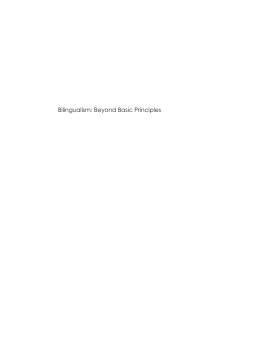
Additional Information
Book Details
Abstract
The publication of Hugo Baetens Beardsmore’s book Bilingualism: Basic Principles by Multilingual Matters in 1982 coincided with an unprecedented upsurge of interest in bilingualism. A major reason for this was the acknowledgement that bilingualism is far more common than was previously thought, and perhaps even the norm. The number of bilinguals at the turn of the third millennium is probably greater than ever before and will continue to grow as a result of the combined forces of globalisation, automatisation, increased mobility and migration, and modernisation of foreign language teaching. The contributions in this book prove that, given the right conditions, bilingualism can confer distinct benefits like intellectual, psychological, social, cultural and economic improvement on the individual. The papers in this volume have been written by leading scholars in the field of bilingualism and deal with individual bilingualism, societal and educational phenomena, addressing issues such as bilingual usage, acquisition, teaching, and language planning and policy. The volume’s major asset lies in its diversity, not only in depth of investigation and in topical variety but also in the range of languages and geographical regions covered. Another important feature of the volume is its multidisciplinary perspective. Among the contributors are linguists, sociologists, psychologists and sociolinguists.
Jean-Marc Dewaele obtained his PhD at the Vrije Universiteit Brussel under the supervision of Hugo Baetens Beardsmore. He is Senior Lecturer in French Applied Linguistics at Birkbeck College, University of London. He has published widely on psychological, psycholinguistic, sociolinguistic and linguistic aspects of foreign language production.
Alex Housen obtained his PhD from the Vrije Universiteit Brussel under the supervision of Hugo Baetens Beardsmore. He is currently a Research Fellow of the Belgian National Fund for Scientific Research (Flanders). His research interests include bilingualism, bilingual education, second/foreign language acquisition and language education. He has worked as a consultant on bilingual education for the Soros Foundation, the United Nations Development Programme and the Belgian Ministry of Education. His publications have appeared in various collected volumes and journals.
Li Wei received his MA and PhD from the University of Newcastle upon Tyne, UK, where he is Professor of Applied Linguistics and Head of the School of Education, Communication and Language Sciences. His research interests include bilingualism and cross-cultural pragmatics. He is Editor of the International Journal of Bilingualism.
Table of Contents
| Section Title | Page | Action | Price |
|---|---|---|---|
| Contents | v | ||
| Preface: Bilingualism: The Customers’ Point of View | vii | ||
| Contributors | ix | ||
| Introduction and Overview | 1 | ||
| Chapter 1 Who’s Afraid of Bilingualism? | 10 | ||
| Chapter 2 The Importance of Being Bilingual | 28 | ||
| Chapter 3 Towards a More Language-centred Approach to Plurilingualism | 43 | ||
| Chapter 4 Bilingual Education: Basic Principles | 56 | ||
| Chapter 5 Bilingual Encounters in the Classroom | 67 | ||
| Chapter 6 Language Planning: A Grounded Approach | 88 | ||
| Chapter 7 Accepting Bilingualism as a Language Policy: An Unfolding Southeast Asian Story | 112 | ||
| Chapter 8 Markets, Hierarchies and Networks in Language Maintenance and Language Shift | 128 | ||
| Chapter 9 The Imagined Learner of Malay | 141 | ||
| Chapter 10 Code-switching and Unbalanced Bilingualism | 174 | ||
| Chapter 11 Code-switching: Evidence of Both Flexibility and Rigidity in Language | 189 | ||
| Chapter 12 Rethinking Bilingual Acquisition | 204 | ||
| Laudatio Hugo Baetens Beardsmore – No Hyphen, Please! | 229 | ||
| Index | 233 |
